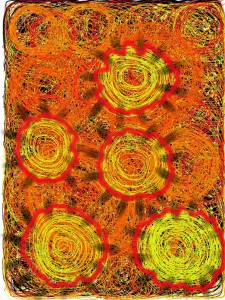
Like many folks, I read the Fireside Fiction report with dismay and anger, but not a lot of surprise. We’ve been talking on the SFWA Board about the findings this past week.
What can SFWA do about it? I could go in full guns blazing and demand that every editor involved in the situation resign and threaten to take markets off the Qualified List if they don’t shape up immediately. This action would, however, probably get nipped in the bud the minute I proposed it to the rest of the board. As I’ve noted before, SFWA is slow and hard to steer. Enforcement on this level is also difficult and impractical, I think, because this selection doesn’t usually happen in the open or in an overt way.
One of the reasons I keep insisting that magazines should be reading blind is that unconscious bias plays a major part in selecting things, which has been demonstrated in study after study. Conventions should be doing panels not on why to read blind, but how to implement it in a working way. Can we insist that magazines read blind? It might work better to encourage it, perhaps, by publicizing the ones that do. And I will point out that magazines who specifically say they welcome diverse stories seem to get more. Submission guidelines do matter.
So do slush readers. They’re one of the first lines of defense around those markets. Magazines need to pay attention to their slush readers, and train them read outside their comfort zone in order to find good stuff. A editor that doesn’t dip into the rejected pile every once in a while may miss some gems as well as a chance to teach their slush readers. That’s how I found Jessica Lee’s Superhero Girl.
One of the more radical things SFWA’s done during my time on the Board is to admit independently and small press press writers. One focus since then has been making sure we give those writers the resources they need not just to write, but to promote their work. This is a good step, but insufficient in this case. Self-publishing is one of the ways around the gatekeepers, but L.E.H. Light mentions this in her piece, “The Fireside Fiction Report: A Reader/Critic’s Perspective“, saying:
“What level of segregation are we headed towards when we get comfortable with having ONLY our own publications as our voice in the genre? And what alternative sources of success, cash flow, and critical acclaim are we walking away from? Can we not have both our own publications and inclusion in “mainstream” works, thereby reaching wider audiences and providing opportunities for more writers? This is an eternal debate, and one which there need never be a solution to. But it is one we need to continue to have, in conjunction with a dedication to support both “streams” of production when possible, so that we pressure the industry both from within and without.”
Writing workshops are a traditional means of networking and support for new writers, but we must acknowledge that scholarships are not enough. The writers workshops tend to advantage the people who already have a good bit of economic privilege, and while scholarships help folks get into the workshop, it’s primarily middle-class folks who have the resources to take six weeks off work and travel.
Remote education may be one of the best bets, material that people can learn from on their own speed and schedule. Right now we’re working on an initiative, led by Maggie Hogarth, called SFWA Ed, that I hope will be helpful in this regard. Classes will focus on craft, business stuff, and the history of speculative fiction. One of the early efforts being worked on right now is an overview of copyright basics, aimed at writers, that will help them from being taken advantage of, for instance.
Setting a good example is one of the best things SFWA can do. Making sure that our Board is a diverse range of members as well as trying to listen to member needs. Making sure our programming at the Nebula Conference doesn’t use black writers only on diversity panels, and that the Recommended Reading list covers a wide range of writers. I actively hunt for good stuff to add to the reading list and I try to find the stuff that people might not run across elsewhere.
Sponsoring more studies like this, trying to get at some of the whys and wherefores, would be great. Unfortunately, something like that would have to get added to the 2017-2018 budget; there’s no room in the current budget, which has been flensed to the point where some efforts had to be shelved.
Personally, I have found the best way to combat bias in yourself is to self-educate “” and then act using that knowledge. I belong to a Facebook group called How to Talk to Other White People about Race”, which has furnished me with a lot of useful tools, but I don’t want to wade into the fray acting like I know everything, because I don’t. I want to help, and I worry that some actions don’t accomplish that or actually detract from the conversation. If you’ve got suggestions, feedback, commentary, or resources, I’m listening.
Some additional useful links:
- Justina Ireland discusses the report
- Phenderson Djèlà Clark on submitting SFF while black
- Rose Lemberg on marginalized writers and self-rejection
#sfwapro




 A few days ago
A few days ago
41 Responses
RT @Catrambo: The Fireside Fiction Report and SFWA: https://t.co/c0WK8O2t0F
RT @Catrambo: The Fireside Fiction Report and SFWA: https://t.co/c0WK8O2t0F
RT @Catrambo: The Fireside Fiction Report and SFWA: https://t.co/c0WK8O2t0F
RT @Catrambo: The Fireside Fiction Report and SFWA: https://t.co/c0WK8O2t0F
RT @Catrambo: The Fireside Fiction Report and SFWA: https://t.co/c0WK8O2t0F
RT @Catrambo: The Fireside Fiction Report and SFWA: https://t.co/c0WK8O2t0F
I’m excited to see what remote education comes out of this. I’m in a position where I can’t go to workshops or even most conventions and I know I’m not the only one.
interesting column, cat.
Che Gilson liked this on Facebook.
Michelle Ristuccia liked this on Facebook.
Ronnie Virdi liked this on Facebook.
RT @Catrambo: The Fireside Fiction Report and SFWA: https://t.co/c0WK8O2t0F
Danielle Myers Gembala liked this on Facebook.
RT @Catrambo: The Fireside Fiction Report and SFWA: https://t.co/c0WK8O2t0F
Lori Deason liked this on Facebook.
Clive Tern liked this on Facebook.
.@sfwa president @Catrambo writes about our #BlackSpecFic report.
https://t.co/LzXcuYjKCG
RT @FiresideFiction: .@sfwa president @Catrambo writes about our #BlackSpecFic report.
https://t.co/LzXcuYjKCG
RT @Catrambo: The Fireside Fiction Report and SFWA: https://t.co/c0WK8O2t0F
@Catrambo so good to know that sfwa’s wheels are turning. Thanks.
RT @Catrambo: The Fireside Fiction Report and SFWA: https://t.co/c0WK8O2t0F
RT @FiresideFiction: .@sfwa president @Catrambo writes about our #BlackSpecFic report.
https://t.co/LzXcuYjKCG
RT @FiresideFiction: .@sfwa president @Catrambo writes about our #BlackSpecFic report.
https://t.co/LzXcuYjKCG
RT @FiresideFiction: .@sfwa president @Catrambo writes about our #BlackSpecFic report.
https://t.co/LzXcuYjKCG
RT @FiresideFiction: .@sfwa president @Catrambo writes about our #BlackSpecFic report.
https://t.co/LzXcuYjKCG
Lee Whiteside liked this on Facebook.
@jsuttonmorse blog post https://t.co/fcRBdDPV1q
RT @Catrambo: The Fireside Fiction Report and SFWA: https://t.co/c0WK8O2t0F
RT @Catrambo: The Fireside Fiction Report and SFWA: https://t.co/c0WK8O2t0F
This is certainly an important topic, one that I recently began raising with the Cascade Writers board to make more effort to bring aspiring writers from these groups into our programs.
Tom Wright liked this on Facebook.
Sally Wiener Grotta liked this on Facebook.
Emily French liked this on Facebook.
RT @FiresideFiction: .@sfwa president @Catrambo writes about our #BlackSpecFic report.
https://t.co/LzXcuYjKCG
RT @FiresideFiction: .@sfwa president @Catrambo writes about our #BlackSpecFic report.
https://t.co/LzXcuYjKCG
RT @FiresideFiction: .@sfwa president @Catrambo writes about our #BlackSpecFic report.
https://t.co/LzXcuYjKCG
RT @FiresideFiction: .@sfwa president @Catrambo writes about our #BlackSpecFic report.
https://t.co/LzXcuYjKCG
Jaime O. Mayer liked this on Facebook.
What a travesty! And an excellent program that is at least a small start in the direction of fairness. And it is not just a travesty for the writers themselves. The literary world is being denied the fruits of their artistry.
RT @FiresideFiction: .@sfwa president @Catrambo writes about our #BlackSpecFic report.
https://t.co/LzXcuYjKCG